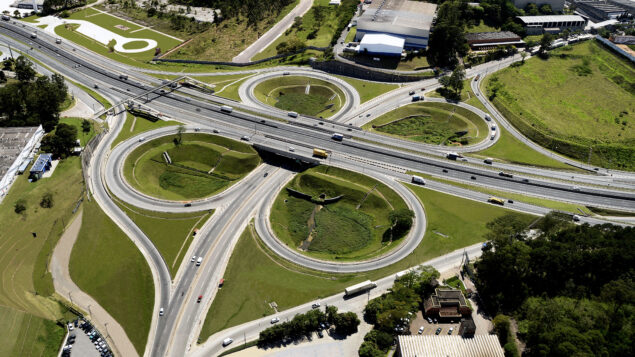CCR Reports Record-Breaking Second Quarter: A Testament to Brazil’s Economic Revival
A Quarterly Highlight for CCR:
Brazilian infrastructure giant CCR has reported a record-setting second quarter, with unprecedented figures in revenue, EBITDA, and net profit. This strong financial performance underscores a significant boost in the country’s economic activities, particularly in the transportation sector.
CCR, which operates a vast array of toll roads, airports, and urban mobility networks, has seen robust demand across all its business units. This surge is fueled by a combination of increased traffic volumes, strategic cost-cutting measures, and sustained economic growth.
Unprecedented Traffic on Toll Roads:
One of the standout performers in CCR’s portfolio is the Autoban system, the company’s largest toll road network. In June, Autoban recorded its highest-ever traffic volume, with 26.7 million equivalent axles passing through. This is a slight increase from the previous record set in November 2023, with 26.4 million axles.
Commercial traffic on the Autoban has surged 47% above pre-COVID levels, reflecting a broader recovery in Brazil’s economy. The rise in truck and trailer traffic is particularly notable, driven by increased export activities bolstered by a stronger US dollar.
“It’s a very positive signal of the quality of our assets and Brazil’s economic activity,” said CCR’s CEO, Miguel Setas, in a recent interview. “Our GDP expectations for this year are higher than they were at the beginning of the year.”
Financial Performance:
CCR’s second-quarter financials are impressive, with net revenue reaching R$ 3.48 billion, marking a 12.8% increase from the previous year. The EBITDA rose by 14.4% to R$ 2 billion, and net profit more than doubled to R$ 411 million. Though EBITDA fell slightly short of Bloomberg’s consensus estimate of R$ 2.1 billion, net profit surpassed expectations by 2.2%.
Airport and Urban Mobility Growth:
The company also experienced strong performance in its airport operations, with traffic growing by 9% in the quarter. The Confins Airport in Belo Horizonte was a standout, recording over 1 million passengers in June alone, a 15% increase from the previous quarter. CCR has expanded its route offerings, such as the new BH-Curaçao route, further driving this growth.
Urban mobility also saw an 8% increase in traffic, bolstered by new line operations. In Bahia, two metro stations were inaugurated, and in Rio de Janeiro, the opening of the Terminal Intermodal Gentileza (TIG) led to a 29% surge in traffic. Significant growth was also seen in São Paulo’s metro lines 5 and 4, with increases of 11% and 5%, respectively.
Strategic Financial Management:
Despite substantial investments, CCR’s leverage increased slightly from 3x to 3.1x EBITDA. The company aims to maintain leverage between 2.5x and 3.5x EBITDA. "We’ve been stable at around 3x for five quarters, within our target range,” Setas noted. “We’ve also been active in liability management, swapping expensive debt for cheaper options and extending terms.”
As part of these efforts, CCR recently raised R$ 2.2 billion through debenture issuance and secured over R$ 10 billion in incentivized debentures from the BNDES. These funds are earmarked for major projects like the CCR Rio-SP, which includes significant expansions to the Rio-Santos and Dutra highways.
Looking Ahead:
CCR’s optimistic outlook for the second half of the year aligns with the continued strong economic recovery in Brazil. The company has made substantial investments, with R$ 1.6 billion spent in the second quarter, a 16.6% increase from the previous quarter. CCR is valued at R$ 25 billion on the B3 stock exchange, though its stock has fallen 6.3% over the past year, largely reacting to interest rate fluctuations.
For more detailed information about CCR and its operations, visit their official website.
As Brazil continues to recover from the economic disruptions caused by the COVID-19 pandemic, CCR’s performance provides a hopeful glimpse into the country’s economic resurgence and underscores the critical role of infrastructure in facilitating growth and development.
